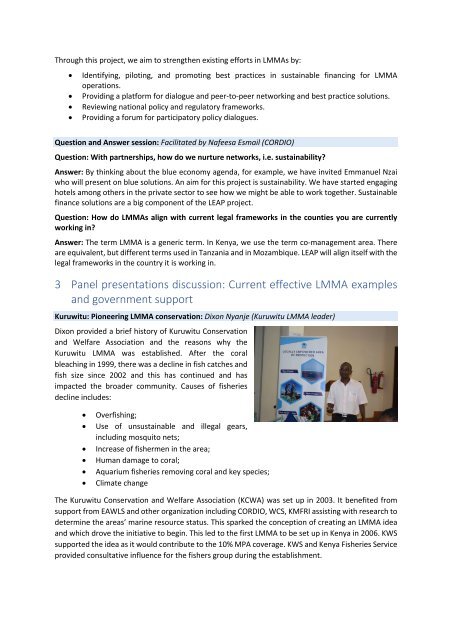EV1 Inception Workshop Report_CORDIO-IKI-IUCN_11.05.2020_KE
You also want an ePaper? Increase the reach of your titles
YUMPU automatically turns print PDFs into web optimized ePapers that Google loves.
Through this project, we aim to strengthen existing efforts in LMMAs by:<br />
• Identifying, piloting, and promoting best practices in sustainable financing for LMMA<br />
operations.<br />
• Providing a platform for dialogue and peer-to-peer networking and best practice solutions.<br />
• Reviewing national policy and regulatory frameworks.<br />
• Providing a forum for participatory policy dialogues.<br />
Question and Answer session: Facilitated by Nafeesa Esmail (<strong>CORDIO</strong>)<br />
Question: With partnerships, how do we nurture networks, i.e. sustainability?<br />
Answer: By thinking about the blue economy agenda, for example, we have invited Emmanuel Nzai<br />
who will present on blue solutions. An aim for this project is sustainability. We have started engaging<br />
hotels among others in the private sector to see how we might be able to work together. Sustainable<br />
finance solutions are a big component of the LEAP project.<br />
Question: How do LMMAs align with current legal frameworks in the counties you are currently<br />
working in?<br />
Answer: The term LMMA is a generic term. In Kenya, we use the term co-management area. There<br />
are equivalent, but different terms used in Tanzania and in Mozambique. LEAP will align itself with the<br />
legal frameworks in the country it is working in.<br />
3 Panel presentations discussion: Current effective LMMA examples<br />
and government support<br />
Kuruwitu: Pioneering LMMA conservation: Dixon Nyanje (Kuruwitu LMMA leader)<br />
Dixon provided a brief history of Kuruwitu Conservation<br />
and Welfare Association and the reasons why the<br />
Kuruwitu LMMA was established. After the coral<br />
bleaching in 1999, there was a decline in fish catches and<br />
fish size since 2002 and this has continued and has<br />
impacted the broader community. Causes of fisheries<br />
decline includes:<br />
• Overfishing;<br />
• Use of unsustainable and illegal gears,<br />
including mosquito nets;<br />
• Increase of fishermen in the area;<br />
• Human damage to coral;<br />
• Aquarium fisheries removing coral and key species;<br />
• Climate change<br />
The Kuruwitu Conservation and Welfare Association (KCWA) was set up in 2003. It benefited from<br />
support from EAWLS and other organization including <strong>CORDIO</strong>, WCS, KMFRI assisting with research to<br />
determine the areas’ marine resource status. This sparked the conception of creating an LMMA idea<br />
and which drove the initiative to begin. This led to the first LMMA to be set up in Kenya in 2006. KWS<br />
supported the idea as it would contribute to the 10% MPA coverage. KWS and Kenya Fisheries Service<br />
provided consultative influence for the fishers group during the establishment.


















